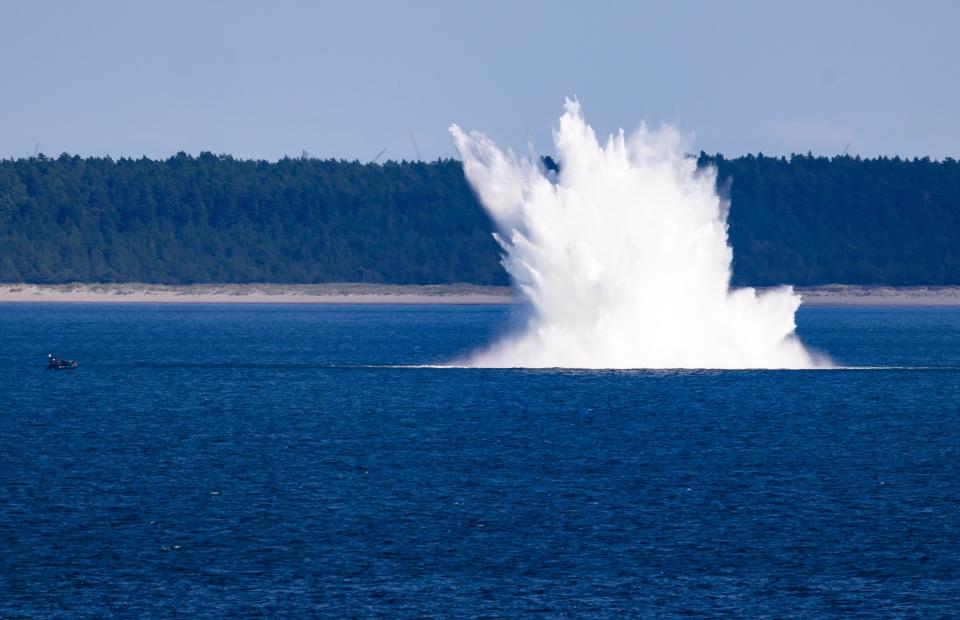How Taiwan could depend on one of the cheapest naval tactics to stop a Chinese invasion
Naval mines could be a cheap but useful addition to Taiwan's defenses.
Experts have argued that for Taiwan to develop a "porcupine" strategy, and mines could be key.
But they wouldn't be a catch-all defense, and there are many difficulties to navigate when deploying mines.
Facing an aggressive China that is willing to use force to achieve the unification it has sought for decades, Taiwan needs strong strategies to deter, and if it comes to fighting, defend.
An element of that strong defense, experts argue, could be one of the cheapest naval tactics: sea mines. The under-the-water, hidden explosives could be key to derailing an amphibious assault and waging asymmetric warfare against China's superior navy.
Experts say that naval mines could be very useful for stopping China's People's Liberation Army Navy or, at the very least, creating major headaches during an invasion.
"Strategically placed naval mines would allow Taiwan to leverage its natural geographic advantages to strengthen deterrence by denial and build a formidable defense in depth," experts and analysts wrote in a post for War on the Rocks earlier this month.
"Exploiting Taiwan's shallow waters and treacherous coastline, mines employed at different water depths and locations would offer Taiwan a low-cost and effective means to delay, disrupt, and degrade Chinese forces," Jonathan Dorsey, Kelly Grieco, and Jennifer Kavanagh said.
Mines force Chinese ships to contend with the explosive threat before pushing forward. Vessels like minesweepers could be sent out to clear the mines, but that effort would take time and could delay and hinder China's assault plans.
Mines wouldn't solve all Taiwan's problems, but as a part of a larger "porcupine" strategy, which US officials and experts have spoken to in the past, it could be quite effective.
The idea of a "porcupine" defense could include a "large number of small things," meaning asymmetric platforms that, when mixed with high-cost joint force systems such as advanced fighter jets and drones, provide effective deterrence and defense.
In the event of a Chinese invasion of Taiwan, "the goal should be to provide critical time for more US firepower to be brought to bear, and to reduce the number of PLA forces that need to be either targeted en route or defeated at the water's edge," Scott Savitz, a RAND senior engineer, wrote last year. "Naval mines are such a capability, complementing various other weapons."

Sea mines have long been a useful way of denying enemy access to an area. As the three experts wrote in their War on the Rocks commentary, nine mines blocked French warships from the harbor of Tamsui in northern Taiwan in October 1884 during the Sino-French War.
They were commonly used in the World Wars and posed major threats to warships.
More recently, sea mines have seen heavy use in the Sea of Azov and the Black Sea during the war in the Ukraine, damaging and destroying ships and making the already dangerous waters even more precarious. Both Ukraine and Russia have used these weapons, which pose a risk not just to military operations but civilian commercial activities.
That speaks to larger problems naval mines pose. While they can be effective deterrence, they can also present a threat to their surrounding environment and civilians, and could be difficult to clear. They can also come loose in a storm or rough waters and drift long distances, leading to unexpected complications.
For Taiwan, another problem here is procuring and deploying the mines. It would take a major effort to prioritize such an effort and it's unclear how China would react if such activities were observed.
In 2022, Taiwan added minelaying ships to its fleet as tools to bolster its defense. At the time, per the AP, Lt. Hsu Shu-wei of the Second Mining Operations Squadron said the weapons were to "build up our asymmetric warfare power" and stop "the enemy from getting on our island."
But, additional capabilities would be required to fully employ a naval mine defense.
"Though mines would significantly strengthen Taiwan's deterrence and defense, Taipei has not made the necessary preparations," Dorsey, Grieco, and Kavanagh said in their commentary, stressing that "investing in the necessary capabilities and improving readiness to carry out mining operations" should be "top priorities for Taiwan."
Read the original article on Business Insider

